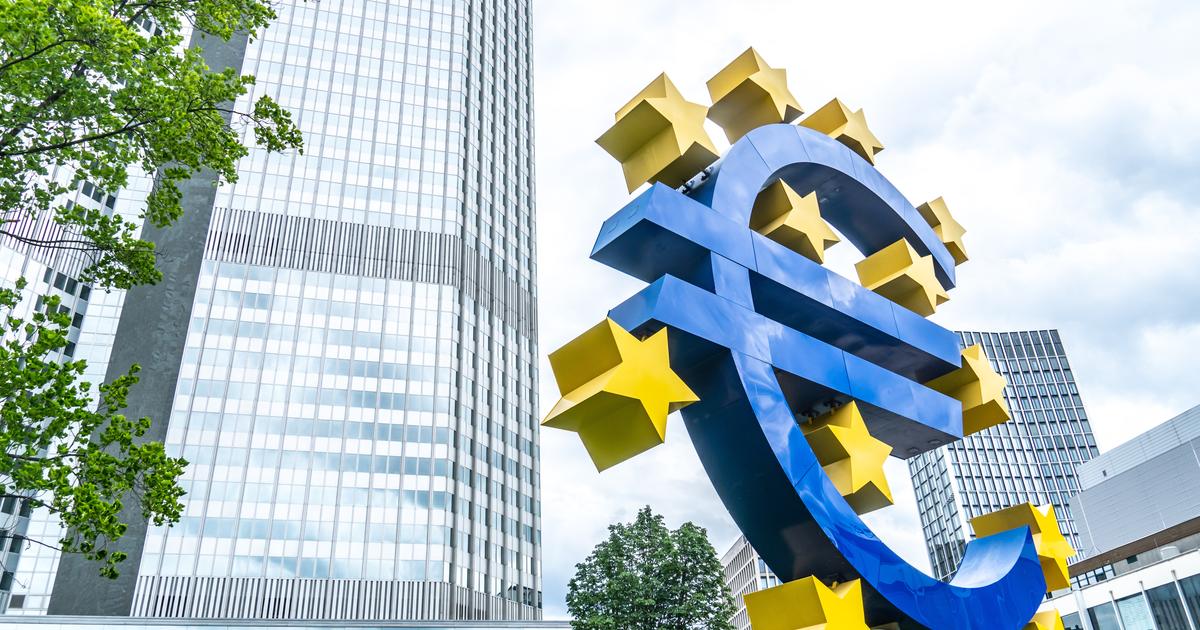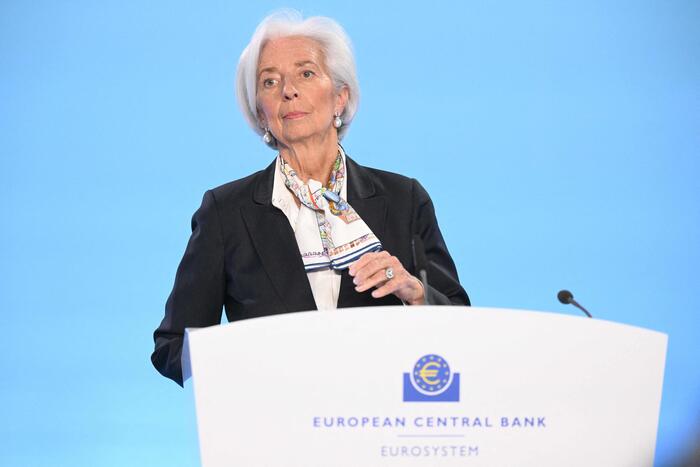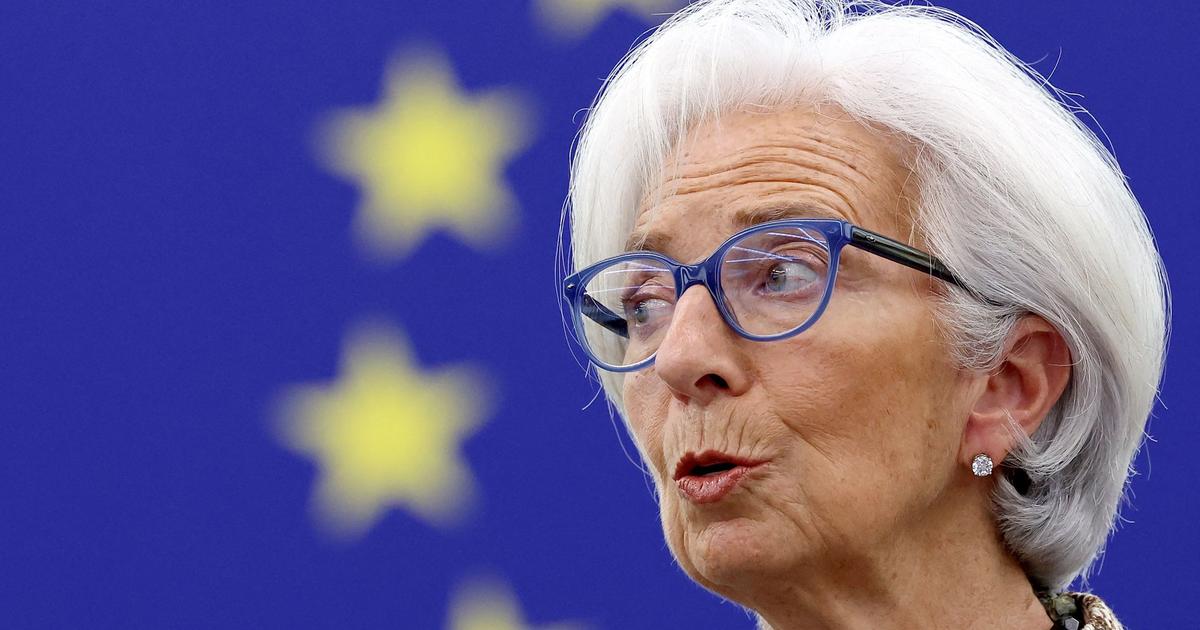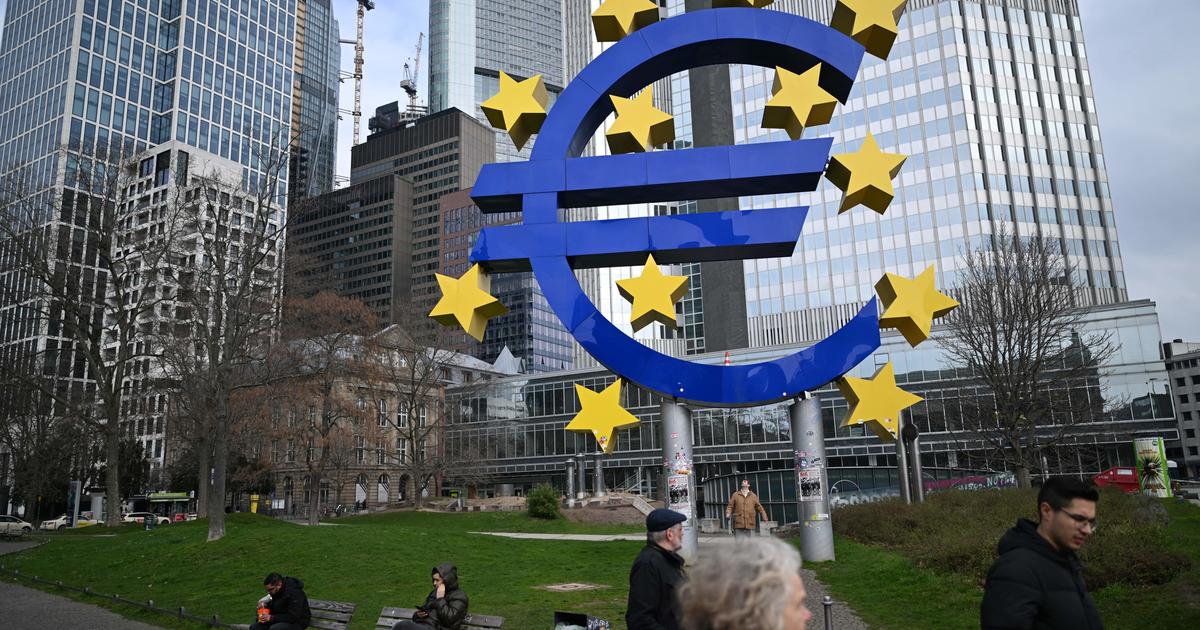Enlarge image
ECB President
Christine Lagarde
(left)
,
US Treasury Secretary
Janet Yellen:
Sorry but no sorry
Photo: Andrew Harrer/Bloomberg via Getty Images
"I think I was wrong at the time about the development of inflation,"
Janet Yellen
(75), the former head of the US Federal Reserve, said last week.
She simply did not correctly foresee the shocks and their effects on the US economy when she still described inflation as a "small risk" in 2021.
Christine Lagarde
(66), President of the European Central Bank (ECB), on the other hand, emphasizes that she has nothing to regret.
It is important to react "appropriately" and "flexibly" to the ups and downs of the value of money and the economy at all times, Lagarde said in a conversation in Hamburg in April, saying that one is "on the way to correction".
In the meantime, she has announced a historic turnaround.
This Thursday, the ECB board of directors is to decide on the caesura at the meeting in Amsterdam.
The council is expected to announce the end of the multi-billion dollar bond-buying program APP, which in turn is a prerequisite for a rate hike in July.
Another interest rate hike is to follow in September, which would bring the deposit rate for banks from the current minus 0.5 percent to 0 percent – the end of negative interest rates.
The central bank is thus heralding the end of the low interest rate policy after 13 years.
In the spring of 2009, the ECB reacted to the financial and debt crisis and cut the key interest rate from 4 to 1 percent.
The key interest rate in the euro zone has been 0 percent since 2016.
In their efforts to prevent a recession and falling prices (deflation), the central banks flooded the markets worldwide with cheap money for years - despite warnings of impending inflation.
Now the central bankers can no longer ignore the price increases.
Within 17 months, inflation in Euroland has soared from 0.9 percent (January 2021) to 8.2 percent (May 2022), it is the highest rate of inflation since the introduction of the euro (see chart).
Driven by skyrocketing energy and food prices, it could set new records in July.
Have the monetary watchdogs simply underestimated the development of inflation?
Is the turning maneuver too late now?
A chronology of the past 17 months helps to answer these questions.
It also shows how the ECB manages its most important currency – trust.
Spring 2021: The money party reaches its peak
Euro inflation rates 0.9 percent (January), 0.9 (February), 1.3 (March)
ECB: Increase pace of bond purchases; Fed: Better stimulus "too big" than "too small"
At the beginning of 2021, the ECB is still fully relying on the old recipes: helping the economy out of the Corona crisis with cheap money.
The monetary watchdogs at the time noticed the slow increase in inflation.
However, the ECB will "see through" the rise in inflation, says Lagarde.
After all, the price increase is determined by “temporary factors” such as the consequences of Corona and the adjustment of VAT in Germany.
"Temporary" will be one of the key words for the coming months, "transitory" in English.
As a result of this assessment, the Eurobankers are increasing the pace of their bond purchases: The purchases made as part of the "Pandemic Emergency Purchase Program" (PEPP) are expected to be "significantly more extensive" in the second quarter and come "on top" of the regular bond purchase program (APP).
Motto: A lot helps a lot.
In the USA, the new President
Joe Biden
(79) signs the "Economic Relief Plan" in March.
Up to 2 trillion dollars are to be pumped into the market to reduce unemployment and increase demand.
Millions of US citizens receive $1,400 checks from the government.
Biden fears that the stimulus program could be too small rather than too big.
Economist
Larry Summers
warns: He expects stagflation and recession in 2022, coupled with inflation rates of more than 5 percent.
It sounded like a nightmare at the time.
However, the new US Treasury Secretary Yellen, the ex-Fed chief, says she sees "no significant risk" of inflation.
Fed Chair
Jerome Powell
(69) also does not expect inflation "to rise into areas that we have to worry about."
Summer 2021: First doubts about the course
Euro inflation rates 1.6 (April), 2.0 (May), 1.9 percent (June)
ECB "doesn't want to stop too soon"; Yellen irritates the markets - but only briefly
In early summer, the ECB sees its inflation target of 2 percent reached again for the first time in many years.
However, that was no reason to change the expansive monetary policy: If the fiscal support is "reduced too early", the desired recovery could set in late, it was said at the time.
For the central bankers, who have long become accustomed to the role of active supporters of heavily indebted governments, pausing is not an option.
Further aid is "urgently needed" to stimulate the economy and demand, according to the ECB Council meeting on April 22.
The net purchases under the €1.8 trillion emergency aid program PEPP are to continue until the Corona crisis is over.
In the US, Treasury Secretary Yellen casually mentioned the word "interest rate hike" in May.
One day the Fed will probably have to react to price increases and counteract possible overheating in the economy, according to Yellen.
In doing so, she got the markets into a frenzy and two days later verbally backtracked: she doesn't believe that there is an "inflation problem" at the moment.
Inflation could rise to 3 percent, but this would be a "temporary phenomenon".
Investors quickly suppress the moment of shock, the party on the stock exchange continues.
Fall 2021: Oops, a price boost
Euro inflation rates 2.2 (July), 3.0 (August), 3.4 (September)
ECB: Rate hike "2023 at the earliest"; Fed: "Transitory" becomes a mantra
In September, inflation in the euro zone rose to 3.4 percent.
It is the highest price hike in 14 years.
However, the ECB insists that "many of the price-driving effects" will soon disappear again: The corona-related disruption to supply chains, which is causing production costs to rise, should soon be history.
"Don't overreact now" is the motto of the Governing Council.
The central bankers therefore want to “raise interest rates in 2023 at the earliest”.
Monetary policy will "remain expansive for a very long time," promises Lagarde.
In highly indebted euro countries such as Italy, this promise is well received, and investors on the stock exchange continue to feel tailwind for risky investments due to the cheap money.
Lagarde countered the accusation that the ECB was financing governments in the euro zone with its bond purchases: "We had to do what we did," said the head of the ECB at the time.
"How many more people would otherwise be unemployed today?"
In the US, US President Biden is sticking to the mantra that inflation will prove to be a temporary phenomenon.
At the same time, he points out that the government's and central bank's massive stimulus program has already created around 1 million jobs.
In August, the inflation rate fell slightly for the first time in 8 months - the cooling of the economy due to another corona wave strengthened the Transitory fans' worldview.
Winter 2021: Everything will be better next year
Euro inflation rates 4.1 percent (October), 4.9 percent (November), 5 percent (December)
ECB: "We expect prices to fall again in 2022"; Fed: Inflation not "temporary" after all
"We expect prices to fall again in 2022," said ECB President Lagarde almost defiantly during the Governing Council meeting in October.
Meanwhile, inflation rose to 5 percent by the end of the year.
The PEPP bond purchase program is to continue until March 2022.
"We will act if necessary," said Lagarde in an interview in November - adding that the ECB must "be extremely vigilant".
After all, it was the poorer and less privileged people who suffered the most from inflation.
Enlarge image
Jens Weidmann:
The former head of the Bundesbank has been warning of the dangers of inflation for a long time
Photo: ALEX DOMANSKI / REUTERS
The voices of the critics are getting louder: ex-Bundesbank
chief Jens Weidmann
(54), who has been pushing for an end to the extremely loose monetary policy for a long time and announced his departure from the Governing Council at the end of the year, warns once again before leaving: "The ECB should not lose sight of the dangers of inflation."
Economist
Volker Wieland
(56) agrees: there is a risk that inflation in Germany will exceed the ECB's target of 2 percent "in the coming years."
High government debt was often accompanied by rising inflation.
If central bankers keep interest rates low so that states can bear their debts, this drives up inflation and is at the expense of savers.
The economist
Gabriel Felbermayr
(45) expects strong wage increases of 5 percent per year due to the shortage of skilled workers.
This is also driving inflation.
In December 2021, inflation in the US reached 6.8 percent, the highest level in 40 years.
Fed Chair Powell admits that inflation is not "temporary" after all and will continue into 2022.
The Fed must take countermeasures now.
The Fed is reducing its monthly bond purchases.
The aim of the so-called "tapering" is to rapidly reduce the US Federal Reserve's balance sheet, which has swollen to around 9 trillion dollars, and gradually withdraw money from the market.
But that's a long way off: since 2008, the Fed's balance sheet has grown tenfold.
The US Federal Reserve's focus is shifting from tackling unemployment to tackling inflation.
Spring 2022: And then the war began
Euro inflation rates: 5.1 percent (January), 5.9 percent (February), 7.4 percent (March)
ECB: "New Era"; Fed turns interest rates
In January, the euro inflation rate rose to its highest level in a quarter of a century: 5.1 percent.
ECB chief economist
Philip Lane
(52) recalculates and considers euro inflation of 7 percent possible in 2022 – in a “pessimistic scenario”.
Enlarge image
ECB Executive Board Member Isabel Schnabel:
"Greenflation" comes with inflation
Photo: Michael Kappeler/dpa
The next shock comes in February.
The attack by Russian troops on Ukraine causes energy and food prices to skyrocket.
Above all, the prices for grain, natural gas and oil are exploding.
Producer prices in Germany have risen by 24 percent compared to the previous year.
The "hawks" in the Governing Council, led by Dutchman
Klaas Knot
(55), are calling for a quick turnaround in interest rates.
But Lagarde rejects this demand.
Developments in the USA are ahead of those in Euroland, and the ECB has every reason "not to act so quickly and ruthlessly".
Meanwhile, ECB board member
Isabel Schnabel
(50) speaks of a "new age" of energy inflation: Since both climate change and the costs of the green transformation of industry are driving prices, the terms for inflation, which have long been overlooked, are now coming up "Climate inflation" and "Green inflation" as well.
In the US, the Fed is already implementing the turnaround in interest rates in mid-March.
With the first interest rate hike since 2018, it raises the key interest rate by 0.25 percentage points to a range of 0.25 to 0.5 percent and further reduces bond purchases.
US inflation, meanwhile, is heading towards 8 percent.
The Fed has set a goal of raising interest rates to around 2 percent by the end of the year.
Summer 2022: The new inflation landscape
Euro inflation rate 7.4 percent (April), 8.2 percent (May)
ECB: interest rate turnaround in prospect; Fed: Sorry for the misjudgment
In May, inflation in Euroland reached its highest level since the introduction of the euro.
Not only are food and energy prices continuing to rise, the cost of vacation trips, rental and used cars are also increasing after the end of the corona restrictions and exacerbating the problem.
ECB chief Lagarde is promising a turnaround in interest rates in the summer: First, the bond-buying program must be ended, then "the first key rate hike could follow within a few weeks."
Observers are now expecting two interest rate hikes by the ECB in July and September and thus an end to negative interest rates from autumn 2022.
Enlarge image
Fed Chair
Jerome Powell
, Treasury Secretary
Janet Yellen
: "Maybe We Should Have Raised Rates Earlier"
Photo: Kevin Dietsch/AP
Since skilled workers are scarce and the cost of living has risen sharply, economists fear wage rounds of 5 percent and more: In such a wage-price spiral, inflation feeds itself through rising wages and the prices allocated to them. Countermeasures by the central bank are becoming even more difficult.
In the US, the Fed is raising interest rates by another 0.5 percentage point - the largest rate hike in 22 years.
At 8.3 percent, inflation in the US is "much too high," says Fed Chairman Powell.
"Perhaps we should have raised interest rates a little earlier," he admits in retrospect.
US President Biden emphasizes that he takes inflation "very seriously" and that fighting it is now the "top priority" domestically.
In Europe, ECB boss Lagarde speaks of a "new inflation landscape".
Inflation is no longer driven only by external shocks such as war or soaring energy prices, but also by the "reversal of some structural trends".
The war in Ukraine may have heralded the end of "hyperglobalization".
This points to a dramatic scenario for the economy: companies would have permanently higher costs because global supply chains no longer work as they used to.
For more than a decade, globalization served as a dampener on inflation by keeping competition high and production costs comparatively low.
During this phase, the central banks could respond to any crisis with a flood of money without having to worry too much about inflation.
But this world is past.
The days of structurally low inflation rates are over.
The ECB's most important task now is to keep inflation down in order to prevent stagflation (stagnation of the economy with prices rising at the same time).
The central bank no longer has to worry about deflation.
At the same time, with "greenflation" and "climate inflation" she now finds new words for a complex and extremely stubborn problem.
Not only has inflation outpaced monetary policymakers, it has also become more complicated.
After the Fed has pumped around 120 billion dollars a month into the economy since the beginning of the Corona crisis, it is now important for them to catch the inflation and thus restore their credibility.
In doing so, it also accepts that rapid interest rate hikes will plunge the US economy into a recession.
The majority of observers are now assuming this scenario.
After more than ten years of cheap money, the World Bank is already warning of a "lost decade".
Collaboration: Dennis Barg and Florian Schultz









